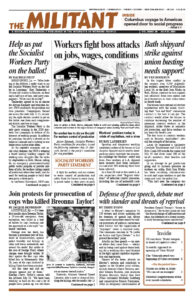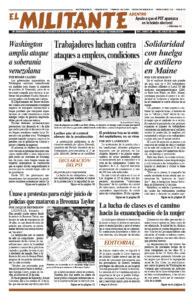Speedup and dangerous working conditions enforced by bosses at Los Angeles Apparel and at nearby meatpacking plants highlight the employers contempt for workers’ safety and lives. Four workers at L.A. Apparel have recently died from coronavirus and over 300 working there have been infected.
In a June 26 visit to this south L.A. site, inspectors cited “flagrant violations” of infection control measures, including the use of makeshift cardboard barriers between workers. The following day inspectors closed the plant.
These conditions and similar conditions elsewhere show the urgent need for a fight by those who work to control all aspects of production — from safety precautions, sanitary facilities, line speeds and break times, and to take decisions on these questions out of the hands of profit-hungry company owners. The bosses’ organization of production is the deadliest threat to workers’ health, safety and lives.
Workers at nine industrial sites, five of them meatpacking plants in south L.A., were struck by similar outbreaks of the disease in May. The largest of these was at the Smithfield Foods-owned Farmer John plant of 1,837 workers. Months earlier a government agency had given meatpacking plant bosses the green light to increase line speeds, pushing workers in the plants into closer proximity in order to ramp up production.
As the capitalist crisis deepens working people are organizing to stand up to the bosses here and around the world.
Thousands of shipyard workers in Bath, Maine, have been on strike since June 22 against bosses’ attempts to replace union members with contract workers and attack seniority protections in order to deepen their attacks on wages and conditions. Some 350 drivers, members of Teamsters Local 25 in Watertown and Everett, Massachusetts, struck Massachusetts Bay Transportation Authority’s The Ride program July 12 after bosses tried to cut their health insurance. These struggles need solidarity from working people and our unions.
In Israel, tens of thousands of mainly youthful demonstrators in Tel Aviv July 11 voiced their anger at monthslong delays of promised government aid to the self-employed and small-business owners. Since a government-enforced lockdown, unemployment in the country has risen to 21%.
Some 12,000 protesters converged on Baghdad, Iraq, from the mainly Shiite south of the country July 12, to protest Prime Minister Mustafa al-Kadhimi’s decision to halt monthly compensation payments from the government to thousands who were previously imprisoned by the Saddam Hussein regime. Government security forces the protesters, shooting and killing two people.
The unprecedented downturn in worldwide production and trade, brought on by government shutdowns, is intensifying competition among workers for jobs. Governments in some places are now reversing steps to reopen commerce and are reimposing shutdowns as fresh outbreaks of the virus surface. Workers face the pressing need to fight for jobs and get us back to work where we can join other workers in the struggles for safer working conditions and better wages.
Bosses inflict massive job cuts
Nearly 33 million working people in the U.S. have filed claims for jobless benefits as of June 20 — five times the peak of unemployment during the 2008 recession.
Some 1.3 million of those newly out-of-work filed claims the first week of July. An additional million self-employed and other workers applied the same week through the federal Pandemic Unemployment Assistance program.
In this wave of layoffs, many job cuts are now permanent as more businesses fold. Bosses at United Airlines said 36,000 workers, almost half the workforce, would be furloughed July 8.
As workers organize to defend ourselves in on-the-job skirmishes and strikes we have opportunities to win allies and build support for our common struggles. These actions and the fight for solidarity with them are the foundation for charting a road forward.


